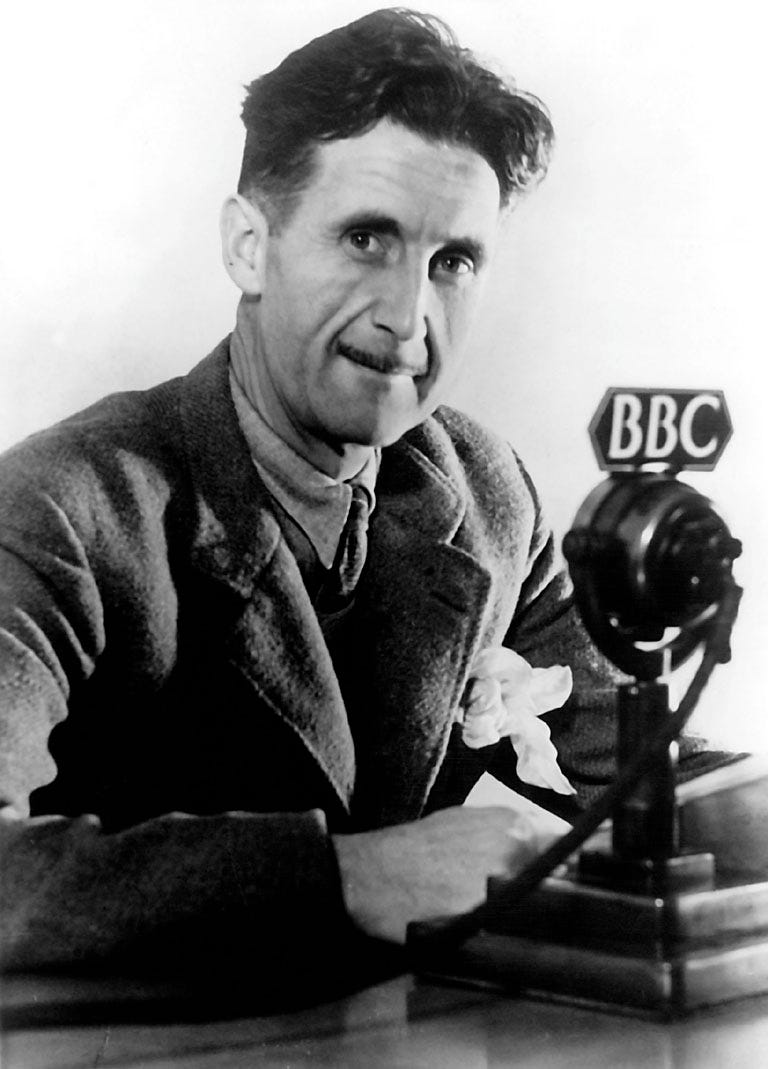Chapter Three: 1984
A Dystopian Vision That Feels Uncomfortably Familiar
1984 is the most famous dystopian novel ever written. In a traditional sense, it is not really a novel at all. Or, as one critic put it, “This is not a great novel, but it is an important book…”1 The characters are not developed as vibrant personalities. There are lengthy descriptions of the dystopian world which the characters inhabit. When the inevitable befalls them, it is not for them that we feel distress. It is for ourselves.
The book presents us with two questions. First, could this dystopian world ever exist? Second, how much of the dystopian vision described exists already?
As a novel, 1984 is not as involving as Darkness at Noon. That said, one is not surprised to learn that Orwell admired Darkness. As a manifesto – or more accurately as an anti-manifesto – 1984 is more effective. Darkness is rooted in reality, the show trials. 1984 is about a nightmare future.
So vivid is the nightmare that phrases from the book have made it into common parlance. “Big Brother Is Watching You!” “Newspeak.” “Thought Police.” The book is so effective that its author has become an adjective -- Orwellian.
The book is disorienting. In normal life, the phrase “big brother” has positive connotations. In 1984, Big Brother is the apotheosis of the tyrant.
Further disorienting is the omnipresence of the lie. The Party, presided over by Big Brother, has three slogans: War Is Peace, Freedom Is Slavery, Ignorance Is Strength. The novel’s protagonist, Winston Smith, works in the Ministry of Truth, which manufactures lies. 1984 is the world turned upside down.
This is a novel about the corruption of memory. It is obsessed with history. Among the novel’s key declarations is: “Who controls the past controls the future. Who controls the present controls the past.” Think about this observation. It is startlingly accurate. In Orwell’s world, “The past was erased. The erasure was forgotten. The lie became the truth.”2
There are a number of similarities between Darkness and 1984. Big Brother and Number One both suggest Stalin. In both books, the Party is all powerful and all knowing. In both, the protagonist lives in physical pain (in one case a severe toothache and in the other an ulcerated leg). In both books, relations with the opposite sex are rendered impossible. Both protagonists betray the love interests in their lives. In both cases, the female is permissive. In Darkness, Orlova says to Rubachev, “You will always be able to do whatever you want with me.”3 “[H]e could do what he liked with her,” observes Winston of Julia in 1984.4 Perhaps this similarity illustrates nothing more than that both these books were written by men.
Both Darkness and 1984 describe a hideous world. Orwell goes to some lengths to explain why in 1984, nobility cannot exist. His explanation is worth quoting:
“In the Middle Ages there was the Inquisition. It was a failure. It set out to eradicate heresy, and ended by perpetuating it. For every heretic it burned at the stake, thousands of others grew up. Why was that? Because the Inquisition killed its enemies in the open, and killed them while they were still unrepentant: in fact, it killed them because they were unrepentant. Men were dying because they would not abandon their true beliefs. Naturally, all the glory belonged to the victim and all the shame to the Inquisitor who burned him. Later in the twentieth century, there were the totalitarians, as they were called. There were the German Nazis and the Russian Communists. The Russians persecuted heresy more cruelly than the Inquisition had done. And they imagined that they had learned from the mistakes of the past; they knew, at any rate, that one must not make martyrs. Before they exposed their victims to public trial, they deliberately set themselves to destroy their dignity. . . . And yet after only a few years, the same thing had happened over again. . . . Why was it? In the first place, because the confessions that they had made were obviously extorted and untrue. We do not make mistakes of that kind. All the confessions that are uttered here are true. We make them true. And above all we do not allow the dead to rise up against us. You must stop imagining that posterity will vindicate you, Winston. Posterity will never hear of you. . . . You will be annihilated in the past as well as in the future. You will never have existed.”5
Could anything like what has been described here ever come to pass? Perhaps it already has, and the evidence of it has been annihilated. We can certainly say this much. In the United States of 2024, lies have a way of becoming true.
Both actors portrayed the protagonist Winston Smith in film adaptations of the novel 1984. The first film was released in 1956 and the second in 1984. The first film is the better of the two.
Arthur Mizener, “Truth Maybe, Not Fiction,” The Kenyon Review, Vol. 11, No. 4 (Autumn, 1949), pp. 685-688
George Orwell. 1984 (Pomodoro Books Online Edition, 2020) p. 51.
Arthur Koestler, Darkness at Noon (New York: Scribner, 2019) p. 102.
George Orwell. 1984 (Pomodoro Books Online Edition, 2020) p. 83.
George Orwell. 1984 (Pomodoro Books Online Edition, 2020) pp. 177 -178.






Once again, you have carried forward with great conviction the concepts embodied in the title of your posts. It fills the reader with dread! Very well done.